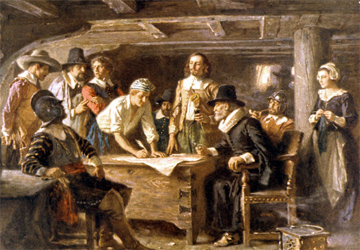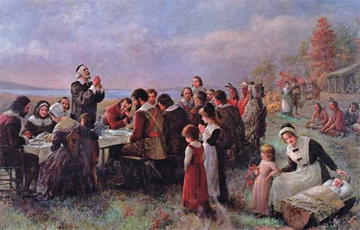Still stuffed with turkey, and in no mood to battle the Black Friday crowds 😯 (most of my Christmas shopping is of the cyber, low-stress variety), I finally had a chance to relax today and reflect on the origins and meaning of Thanksgiving. It seems to me that the story of the Pilgrims is a microcosm of the traditional American Spirit ~
A yearning for freedom from tyranny.
The Pilgrims were;
Calvinist Protestants who rejected the institutional Church of England, believing that worshipping God must originate freely in the individual soul, without coercion. Suffering persecution and imprisonment in England for their beliefs, a group of these separatists fled to Holland in 1608. There, they found spiritual liberty in the midst of a disjointed economy that failed to provide adequate compensation for their labors, and a dissolute, degraded, corrupt culture that tempted their children to stray from faith.
Sound familiar?!
Determined to protect their families from such spiritual and cultural dangers, the Pilgrims left Plymouth, England, on 6 September 1620, sailing for a new world that offered the promise of both civil and religious liberty. After an arduous journey, they dropped anchor off the coast of what is now Massachusetts.

On 11 December 1620, prior to disembarking at Plymouth Rock, they signed the Mayflower Compact, America’s original document of civil government. It was the first to introduce self-government, and the foundation on which the Declaration of Independence and the Constitution were built. Plymouth Colony’s Governor, William Bradford, described the Compact as “a combination … that when they came a shore they would use their owne libertie; for none had power to command them.”
An understanding of human fallibility.
Grounded in scriptural truth the Pilgrims didn’t expect perfection from life, themselves or their fellow man. And yet moved by their faith to be generous and charitable, Plymouth Plantation was originally established as a collectivist society. They initially;
committed all their belongings to a “comone wealth.” In theory, Bradford thought the colony would thrive because each family would receive equal share of produce without regard to their contribution.
It did take long for them to realize the inherent injustice in such a system.
Unfortunately, then as always, collectivism only works in theory. It is antithetical to human nature, and destined to fail, as Plato’s student Aristotle observed in 350BC: “That which is common to the greatest number has the least care bestowed upon it.” But to this day, many still fail to grasp the “tragedy of the commons.”
After abysmal results in 1622, Bradford realized that his collectivist plan had undermined the incentive to produce, noting that it “was found to breed much confusion and discontent, and retard much employment that would have been to their benefit and comfort.” The women complained that being forced into servitude for others was “a kind of slavery,” and some men had become “servants to the Indians” for a mere “capful of corn.” Others had perished.
They decided to trade their collectivist plan for a free market approach, and in 1623, Bradford wrote, “This had very good success, for it made all hands very industrious, so as much more corn was planted than otherwise would have been by any other means the Governor or any other could use. … Women went willingly into the field, and took their little ones with them to set corn. Instead of famine now God gave them plenty and the face of things was changed, to the rejoicing of the hearts of many. … Any general want or famine hath not been amongst them since to this day.”
Property ownership and families freely laboring on their own behalf replaced the “common store,” but only after their ill-advised experiment with communism nearly wiped out the entire settlement.
A firm reliance on providence and God’s sovereignty.
“Enter His gates with thanksgiving, and His courts with praise.
Give thanks to Him and praise His name. For the LORD is good and His love
endures forever; His faithfulness continues through all generations.”
~ Psalm 100:4-5

There were no free cellphones, foodstamps or Obamacare in the 17th century. Nothing but a solid faith in the Lord’s guiding hand and the promise of His divine protection compelled the Pilgrims to climb into a tiny boat, brave the hostile waters of the Atlantic and face the privations and hostilities of an unsettled land.
Today we still reap the blessings of that unshakable faith. Yet, far from being thankful for that Christian legacy, America is increasingly turning elsewhere for salvation, floundering in empty promises and hopeless philosophies. Sadly, we’re headed back to the very tyranny that the Pilgrims fled the Old World to escape.
~~~~~~~~~~~~~~~~~~
Related:
Account of the First Harvest Feast and Thanksgiving ~ Mark Alexander at the Patriot Post [Source of the above excerpts]
Pilgrims’ Gifts ~ from Karin McQuillan at the American Thinker
What we need to re-learn about, and from, the Pilgrims:
Thanks be to God.





Pingback: What a difference 400 years makes | Designs on the Truth